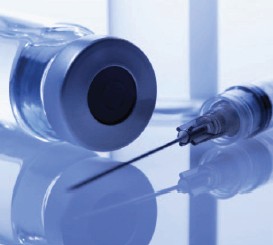Shingles Vaccine

You’ve probably had chickenpox. Perhaps your parents even exposed you to the virus as a small child, when you were likely to have a mild case and be done with it. However, the virus remains dormant in your body throughout your lifetime, and could reappear at any time as a painful disease called “shingles” (medical term herpes zoster).
Shingles can be very unpleasant, starting as a skin rash and often erupting with blisters. Its symptoms usually last a week or ten days, sometimes longer, and may include severe pain, chills, fever, headaches, and an upset stomach. About a million Americans get shingles each year, and they all have had chickenpox or received the chickenpox vaccine. It is estimated that half the people who reach age 85 will get shingles at some point. As people age, they become more susceptible to the disease and it can be more severe.
The good news is there is now a shingles vaccine. Approved by the FDA in 2006, the vaccine has been successful in helping prevent the disease. Some of your friends have probably already had the shingles shot, and you may be wondering if it is right for you.
The Centers for Disease Control and Prevention (CDC) recommends it for people age 60 and older, with some exceptions. You should not get the vaccine if you have a weakened immune system or if you have ever had an allergic reaction to gelatin, neomycin, or any of the vaccine’s other ingredients. Other reasons to avoid the shot include a history of certain cancers or tuberculosis, or if you are undergoing radiation or chemotherapy.
Studies show the vaccine prevents shingles in about half the people vaccinated. However, even when it doesn’t prevent the disease itself, it usually reduces the pain and severity of the disease, including permanent scarring and skin discoloration. Importantly, it helps inhibit a lingering and debilitating condition called “postherpetic neuralgia” that affects some 20 percent of shingles patients, can last months, and may even become chronic.
The shingles vaccination involves a single injection of a live, weakened virus. Because it is a live vaccine, side effects might include headache as well as tenderness, redness, swelling, and pain at the injection site. If you develop a rash from the vaccine, it is possible to transmit the virus to a susceptible person, who may get chickenpox but not shingles.
If you are age 60 or older, have had chickenpox, and don’t believe you have any health issues that would prevent you from being a candidate, I recommend that you consider the shingles vaccination. If you have any questions, please call my office and I will be happy to talk further with you. As mentioned earlier, even if you receive the injection and still get shingles, the vaccine could help you avoid more serious complications.
Patients Inquire…
Since shingles is a herpes virus, is it related to other herpes disorders, such as cold sores or genital herpes?
The answer is “No.” The only connection is that each of these conditions is a form of herpes, defined as “a viral disease causing skin eruptions.”

